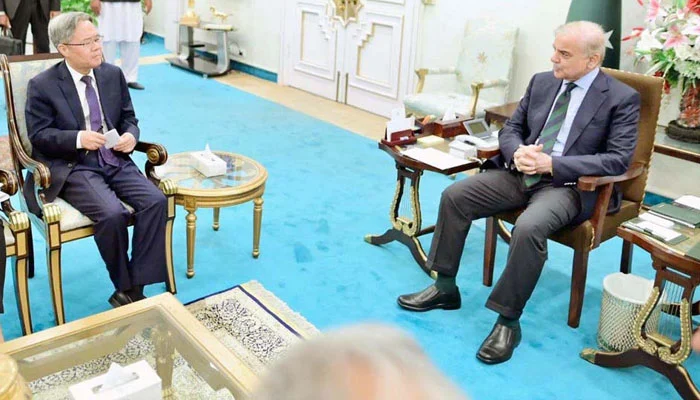
Pakistan is actively seeking to deepen its collaboration with China in multiple sectors, particularly in the realms of Artificial Intelligence (AI) and agriculture. Prime Minister Shehbaz Sharif underscored the importance of this strategic partnership during a meeting with the Chinese Ambassador to Pakistan, Jiang Zaidong, held in Islamabad on Monday.
Expanding Bilateral Ties in Key Sectors
Prime Minister Shehbaz Sharif emphasized that the relationship between Pakistan and China is not only vital for the two nations but also for maintaining regional and global stability. “Pak-China friendship is essential not only for both countries but also for regional and global peace and development,” the prime minister stated during the meeting. He highlighted Pakistan’s desire to enhance cooperation with China in cutting-edge fields such as information technology, AI, and modern agriculture.
The premier’s remarks reflect Pakistan’s growing focus on technological advancements and modernization in various sectors. By partnering with China, a global leader in AI and technology, Pakistan aims to boost its capabilities in these critical areas, which are expected to drive future economic growth.
China-Pakistan Economic Corridor (CPEC) and Strategic Partnership
The discussion also covered the ongoing strategic partnership between Pakistan and China, which has withstood various challenges over the years. Prime Minister Sharif praised China’s unwavering support for Pakistan, particularly during difficult times. He acknowledged the Chinese leadership’s commitment to enhancing bilateral ties and further developing the China-Pakistan Economic Corridor (CPEC).
CPEC, a flagship project under China’s Belt and Road Initiative, has been a cornerstone of the Pakistan-China partnership. The initiative aims to improve infrastructure, boost economic activity, and strengthen regional connectivity. Prime Minister Sharif reiterated Pakistan’s commitment to taking CPEC to the next level, with plans to establish industrial zones as part of this ambitious project.
High-Level Engagement and Future Prospects
Deputy Prime Minister Muhammad Ishaq Dar, Special Assistant to the Prime Minister Tariq Fatemi, and other senior officials were also present at the meeting. Their involvement underscores the high level of importance Pakistan places on its relationship with China.
The prime minister’s recent visit to China in June, where he met with representatives of leading Chinese companies, further demonstrated Pakistan’s commitment to fostering economic ties with its neighbor. During the five-day trip, discussions centered around encouraging Chinese investment in Pakistan, particularly in sectors such as technology and industry.
Pakistan’s Vision for AI and Technological Advancement
Pakistan’s push to collaborate with China in AI and technology aligns with the country’s broader vision for technological advancement. By leveraging China’s expertise, Pakistan hopes to accelerate its development in these areas, which are increasingly seen as crucial for economic competitiveness.
The collaboration is expected to bring significant benefits, including the transfer of knowledge, skills, and technology. For Pakistan, this partnership could pave the way for innovations in AI, which can be applied across various industries, from healthcare to agriculture.
Enhancing Regional and Global Peace through Cooperation
Prime Minister Sharif’s emphasis on the importance of Pakistan-China friendship for regional and global peace highlights the strategic dimension of this partnership. As the two countries continue to strengthen their ties, their collaboration in AI and other sectors could serve as a model for international cooperation in addressing global challenges.
In conclusion, Pakistan’s efforts to boost collaboration with China in AI, agriculture, and other key sectors reflect a forward-looking approach to economic development. The strategic partnership between the two nations is poised to play a pivotal role in shaping the future of technology and regional stability.